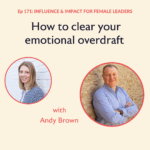When I was sent a book called The Emotional Overdraft I instinctively knew that this was a topic that was going to resonate with me personally and you as listeners to this podcast.
An emotional overdraft is when you as a leader habitually overcome your employer’s challenges at the cost of our own physical and mental health. Sound familiar?
I am seeing this happening a LOT at the moment with the women within my Women Leading community so I was excited to dive into the topic with the book’s author Andy Brown.
We discussed:
- The cost of going too deep into your emotional overdraft
- How to start paying it back
- What behaviours or drivers create our emotional overdraft
- The role of management skills and influencing in changing a culture which relies on people being emotionally overdrawn
- How to approach urgency and filling short term gaps more strategically
- How the emotional overdraft shows up outside of work
My name’s Carla Miller, leadership coach, author and trainer. And this is the Influence & Impact podcast for women leaders, helping you confidently navigate the ups and downs of leadership and feel less alone on your journey as a leader. In fortnightly episodes I share practical tools and insights from myself and my brilliant guests that will help you succeed in your career.
FREE RESOURCE – How To Say No Challenge:
If you struggle to say ‘no’ then this free 5 day challenge is for you. You’ll receive a short email each day containing a short video taking you through the 5 steps of my How To Say No framework. We’ll get you happily saying no in just 5 days!
Join the next cohort of Influence & Impact to learn how to tackle self-doubt, increase your impact and become brilliant at influencing. It’s a small cohort working closely with me and includes 6 workshops and 2 peer coaching sessions.
My Be Bolder 4 week confidence and assertiveness course will be running again in February. In it we cover:




My Women Leading community gives you the support and strategies you need to:





All for just £49/month
About Andy Brown:
Andy has over 30 years’ experience as an award-winning adviser and coach for people-based businesses. He’s also a podcast host and the author of Amazon #1 best seller, ‘The Emotional Overdraft: 10 simple changes for balancing business success and wellbeing’ a book for entrepreneurs, leaders and founders that articulates the often overlooked mental and physical costs of leadership
Links from Andy:
Buy the book in the UK
Complete the free Emotional Overdraft Self-Assessment
Follow Emotional Overdraft on Instagram
Get all the latest Emotional Overdraft articles
